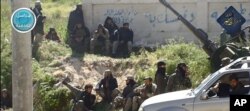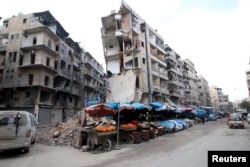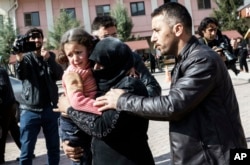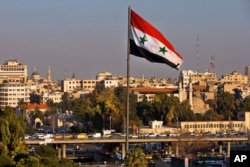Rebel commanders and opposition activists are warning that jihadist recruitment of Syrian fighters is likely to jump in the coming months because of the collapse of some moderate militias and a shake-up of others in the wake of a Russian-backed Syrian government offensive in northern Syria.
But it is not Abu Bakr al-Baghdadi’s Islamic State that will benefit the most, but al-Qaida affiliate Jabhat al-Nusra, they warn.
Al-Nusra has pursued a stealthier approach in Syria than its jihadist rival, alternately intermingling with other rebel militias and assisting them when more is to be gained or turning on them and seeking to dominate when circumstances change.
With the majority of Jabhat al-Nusra's fighters being Syrian — analysts estimate only about 20 percent of the group’s fighters are from overseas — the group has appeared less alien than IS and more rooted in the country.
Battlefield effectiveness
Jabhat al-Nusra and ally Ahrar al-Sham, a hardline Islamist faction al-Qaida veterans were instrumental in forming, have legitimacy among Syrian rebels, not so much for ideological reasons but because of their effectiveness on the battlefield, say rebel commanders.
Jabhat al-Nusra is being seen by rebel fighters as the best vehicle to continue the fight against President Bashar al-Assad and his foreign Shi’ite allies from Iran and Lebanon.
“Many fighters already furious with the West for its passivity in the face of the Russian airstrikes and Assad offensive will feel they have no other option but to join with the jihadists,” says Bassam al-Kuwaitli, a well-known figure in political opposition circles. “They will follow the money and join who can supply them with arms,” he laments.
Al-Qaida’s affiliate is expanding geographically, sending fighters back into Aleppo a year-and-half after it withdrew from the city to focus on building control of neighboring Idlib province as a counter to the Islamic State's presence in Raqqa and Deir ez-Zor.
Redeployment into Aleppo
The redeployment back into Aleppo came as the Russian-backed Assad offensive unfolded last month in northern Syria. Al-Nusra fighters set up checkpoints to protect larger incoming conveys. The group also expropriated several large buildings and warehouses in rebel-held districts of Aleppo for use as offices and barracks.
Political activists quickly raised an alarm about the large presence of al-Nusra fighters, arguing it would make more sense to have them on the outskirts of the city if they were there to combat the Assad offensive in the suburbs of Aleppo.
Anger beyond borders
Al-Nusra’s rejection of a proposal by moderate rebels and Islamic nationalists for a unified police force to be formed in Aleppo also prompted concern and fears the al-Qaida affiliate will impose its will on rebel-held districts, helped by the rising bitterness among Syrian rebel factions and civilians directed at the West for not confronting Assad and his allies, the Russians.
The anger can be heard in southern Turkish border towns.
“The Americans, the Russians, the regime, they are all responsible for the deaths, for the killing of Syrians,” said Mustafa, a refugee in Kilis. His words were greeted with vigorous nods by a small crowd of Syrians.
In a joint study issued last month by the Institute for the Study of War and the Critical Threats Project at the American Enterprise Institute, both Washington-based research organizations, analysts warned Western powers “must alter the popular narrative that the West has abandoned the Syrian Sunni Arabs in favor of Iran, Assad, and Russia.”
In search of a strategy
In the report, “Jabhat al-Nusra and ISIS: Sources of Strength,” the analysts concluded, “Identifying means of separating Jabhat al-Nusra from the opposition in order to destroy it is the most difficult intellectual task in developing a strategy for Syria."
Developing such a strategy and countering al-Nusra is not being helped by the Assad government or the Russians. The targeting of al-Nusra, which has been excluded from the shaky U.N.-mediated cessation of hostilities, is building up even more sympathy among rebel fighters for al-Qaida’s affiliate, cautions Nader Othman, deputy prime minister in the opposition's Syrian Interim Government.
“The Assad offensive has damaged the moderates, and more fighters will move over to al-Nusra and Ahrar al-Sham,” he says. “This is the logical result. Only five percent of Russian airstrikes were on ISIS, most were on us, the moderate rebels. And the regime’s idea was to demolish the moderate alternative to the regime.”
“People will keep on fighting, but we should worry about where the fighters whose militias collapse will go,” he adds.
“There is huge danger,” says a Turkey-based European diplomat. “This war is going to become more terrorist-based, more of an underground fight. Many more fighters are going to become highly radicalized and we are going to be seen as much the enemy as Assad.”
“They feel the world is against them and they will lash out,” he adds.








